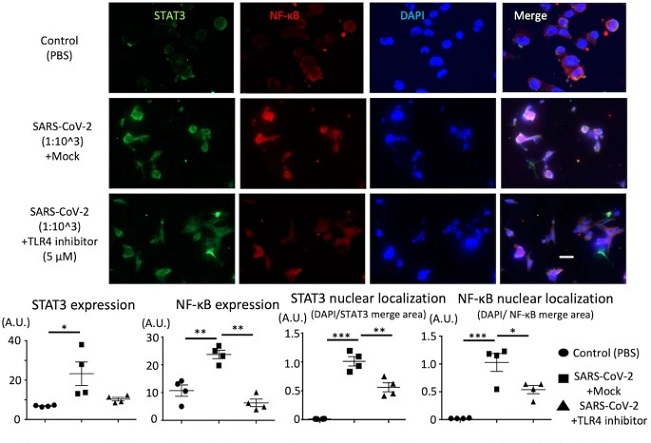Japanese Study Finds That SARS-CoV-2 Mediated Kidney Injury Can Be Prevented By Inhibition Of Toll-Like Receptor 4 And Interleukin-1 Receptor
Thailand Medical News Team Aug 10, 2023 1 year, 8 months, 1 week, 1 day, 3 hours, 45 minutes ago
COVID-19 News: The coronavirus disease 2019 (COVID-19) pandemic, caused by the severe acute respiratory syndrome coronavirus 2 (SARS-CoV-2), has brought about unprecedented challenges to global health. Among the severe complications that have emerged, acute kidney injury (AKI) has been a particularly concerning and potentially fatal consequence of COVID-19 as covered by many past studies, case reports and
COVID-19 News coverages.
 The immunostaining of STAT3 and NF-κB in HK2 cells incubated with SARS-CoV-2 (dilution/1:103) treated with mock or TLR4 inhibitor (for 72 h incubation).
The immunostaining of STAT3 and NF-κB in HK2 cells incubated with SARS-CoV-2 (dilution/1:103) treated with mock or TLR4 inhibitor (for 72 h incubation).
As researchers around the world strive to unravel the complex interactions between SARS-CoV-2 and various organs, a groundbreaking study conducted by scientists from Hokkaido University, Obihiro University of Agriculture and Veterinary Medicine, and Sapporo Medical University in Japan has revealed crucial insights into the mechanisms underlying SARS-CoV-2-mediated kidney injury. The study not only enhances our understanding of COVID-19-associated AKI but also presents potential therapeutic targets that could revolutionize the management of this serious complication.
Unveiling the Pathophysiology of COVID-19 AKI
Despite the growing recognition of the link between COVID-19 and AKI, the precise mechanisms through which SARS-CoV-2 affects renal cells and triggers injury have remained elusive. The Japanese research team embarked on a mission to uncover the hidden facets of this interaction by employing an innovative approach. They developed an in vitro model using human kidney cellular components, including immortalized tubular epithelial and endothelial cell lines, to simulate the effects of SARS-CoV-2 infection.
Their findings unveiled a direct correlation between SARS-CoV-2 and cell death in renal cells. Interestingly, the team observed that tubular epithelial cells were more susceptible to SARS-CoV-2-induced injury compared to endothelial cells. Importantly, they noted that SARS-CoV-2 did not replicate within renal cells, in contrast to its replication in other cell types. This unique observation suggested that SARS-CoV-2-mediated kidney injury might be instigated by pathways beyond viral replication.
Toll-Like Receptor 4 and Interleukin-1 Receptor
To unravel the intricate molecular mechanisms at play, the researchers employed advanced transcriptional analysis techniques, utilizing RNA sequencing. This enabled them to gain insight into the genes and pathways that are activated in response to SARS-CoV-2 infection. A fascinating revelation emerged from this analysis: the expression levels of inflammatory and immune-related genes were significantly elevated in renal cells exposed to SARS-CoV-2. This finding indicated that SARS-CoV-2-induced kidney injury is closely tied to the host's immune response.
Further exploration led the researchers to identify Toll-Like Receptor 3 (TLR3) as a key player in this scenario. TLR3, a crucial component of the innate immune system, was found to recognize viral RNA and subsequently trigger c
ell death.
Additionally, the study highlighted the involvement of upstream regulators, with a particular emphasis on the interleukin-1 receptor (IL-1R) and Toll-Like Receptor 4 (TLR4) pathways. Inhibition of these pathways demonstrated the potential to shield tubular epithelial and endothelial cells from injury by regulating the signal transducer and activator of transcription protein-3 (STAT3) and nuclear factor-kB (NF-kB) pathways.
Connecting the Dots - From Cells to Therapeutic Prospects
The culmination of these findings presents a groundbreaking perspective on how SARS-CoV-2 instigates kidney injury and hints at promising therapeutic avenues. The researchers' comprehensive study indicates that SARS-CoV-2 elicits renal cell injury by triggering a proinflammatory response, even without viral replication within the cells. This fresh perspective challenges previous assumptions and expands our comprehension of COVID-19-associated AKI.
Of paramount importance are the implications of the IL-1R and TLR4 pathways as potential therapeutic targets. The study offers an innovative approach to mitigate SARS-CoV-2-mediated kidney injury by modulating these pathways. The researchers' observations align with existing evidence that these pathways play pivotal roles in severe COVID-19 and other inflammatory conditions. The utilization of IL-1R antagonists and inhibitors targeting TLR4 and TLR3 could potentially revolutionize the management of COVID-19-associated AKI, offering a glimmer of hope to patients who are vulnerable to this severe complication.
Translating Bench Findings to Bedside Benefits
While the study's findings are undeniably groundbreaking, the journey from laboratory discovery to clinical application requires further exploration. Clinical observational studies have already hinted at the potential benefits of IL-1R antagonists in reducing the severity of COVID-19 and associated complications. However, the researchers acknowledge the need for in vivo studies to validate the efficacy of these targets and their potential to ameliorate SARS-CoV-2-mediated kidney injury.
The Road Ahead - Tailoring Treatments for Enhanced Patient Outcomes
In the midst of the ongoing battle against COVID-19, where the focus has predominantly been on antiviral drugs and vaccines, this Japanese study offers a new dimension in the fight against the disease. As the global medical community continues to grapple with the complexities of SARS-CoV-2 and its far-reaching impact, the identification of specific pathways that drive kidney injury presents an opportunity to tailor treatments for better patient outcomes.
The journey from bench to bedside is a challenging one, marked by rigorous testing, validation, and translation into clinical practice. Yet, the tantalizing prospect of mitigating a life-threatening complication of COVID-19 through the modulation of IL-1R and TLR4 pathways makes this endeavor all the more compelling.
The study findings were published in the peer reviewed journal: Cell Death Discovery.
https://www.nature.com/articles/s41420-023-01584-x
For the latest
COVID-19 News, keep on logging to Thailand Medical News.
